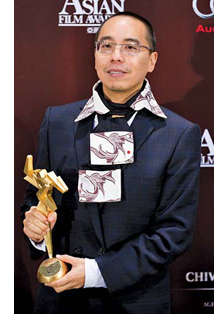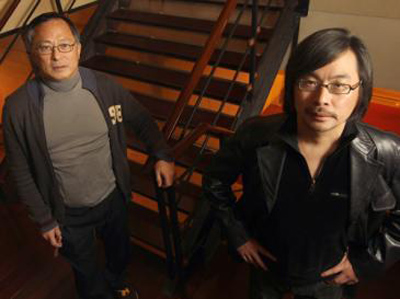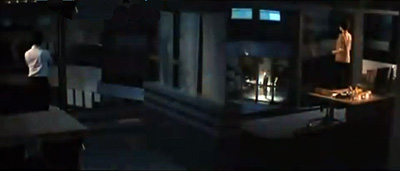Milkyway’s fine romance
Monday | March 21, 2011 open printable version
open printable version
Don’t Go Breaking My Heart.
DB here, from the Hong Kong Film Festival:
First, news. The Asian Film Awards, presented in a glitzy ceremony Monday, held some surprises. Confessions from Japan and Let the Bullets Fly from the Mainland (discussed in my previous entry), each had six nominations going in. But Confessions nabbed no prizes and Bullets won only for Best Costume Design, the award going to William Chang Suk-ping, probably best known as a versatile collaborator with Wong Kar-wai.
 Best Picture winner was festival favorite Uncle Boonmee Who Can Recall His Past Lives, by Apichatpang Weerasethakul (right, in remarkable suit). The Best Director and Best Screenplay awards went to Lee Chang-dong for Poetry (which Kristin and I had liked very much at Vancouver). The winners are picked not by a mass of voters, as with the Oscars, but by a jury drawn from industry figures, critics, and festival executives. The first year’s awards in 2007 was dominated by the crowd-pleasing monster film The Host, which garnered four prizes, but this time two top honors went to arthouse/ festival titles. Still, it was very nice that local industry mainstay Sammo Hung got the Best Supporting Actor kudo for Ip Man 2.
Best Picture winner was festival favorite Uncle Boonmee Who Can Recall His Past Lives, by Apichatpang Weerasethakul (right, in remarkable suit). The Best Director and Best Screenplay awards went to Lee Chang-dong for Poetry (which Kristin and I had liked very much at Vancouver). The winners are picked not by a mass of voters, as with the Oscars, but by a jury drawn from industry figures, critics, and festival executives. The first year’s awards in 2007 was dominated by the crowd-pleasing monster film The Host, which garnered four prizes, but this time two top honors went to arthouse/ festival titles. Still, it was very nice that local industry mainstay Sammo Hung got the Best Supporting Actor kudo for Ip Man 2.
As ever, there were special awards too: one to veteran Busan director Kim Dong-ho, one for Lifetime Achievement to Raymond Chow of Golden Harvest, one to Fortissimo Films for promotion of Asian cinema, and a prize to the top-grossing Asian film. That last was one of the three that went to Feng Xiaogang’s Aftershock (which we wrote about here). For a full listing go here. At Filmbiz Asia Patrick Frater suggests that the catastrophe in Japan gave the ceremony a sombre cast.
Milkyway on the move
Source: South China Morning Post.
When I arrived last week, I was greeted by a long story in the South China Morning Post announcing that Johnnie To Kei-fung and Wai Ka-fai (above), the movers behind Milkyway films, were embarking on a new production strategy.
Although Milkyway movies had cracked the mainland Chinese market in the past, notably with Breaking News (2004), To had made several films that could not be exported. His most personal films, crime stories like The Mission and PTU, violated the PRC’s demands that movies treat the police with respect. Worse, his Election films, which surveyed the treacherous power plays at work in Triad societies, was unthinkable as an export item–especially since the second entry extended its vision to the role played by PRC forces in controlling the Hong Kong crime scene.
Today, however, everyone acknowledges that the primary market for any Hong Kong film with a substantial budget is the mainland. In the SCMP story To and Wai announce their plans to craft a cycle of films for that audience. Romantic comedies and dramas have shown strong legs there, and true to their prolific energies, To and Wai have committed to making three romances this year. The first, Don’t Go Breaking My Heart, opened the festival on Sunday night. To is currently shooting the next one on the Mainland, and the third is set up to follow quickly.
Don’t Go Breaking My Heart, which is better than the Kiki Dee/ Elton John song, is an office romance like Milkyway’s 2000 hit , Needing You. . . . But the creators have deliberately updated the milieu, which includes not only a mainland émigrée as the heroine but also many scenes shot in China, as required by the financing.
The action starts just before the 2008 financial crisis. Cheng Zixin (a charming Gao Yuanyuan) is a lowly staffer at an investment company, while Cheung Sun-yin (Louis Koo) is an executive at a rival firm who first spies her from his sportscar. Noticing that Zixin occupies a cubicle by the window in a building adjacent to his, the ingratiating rascal begins flirting with her through pantomime. The third corner of the triangle is Fong Kai-wang (Daniel Wu), an architect turned alcoholic bum. The affair between Zixin and Sun-yin falls apart because of his attraction to other women, and she develops a platonic affection for Kai-wang, whom she urges to return to his profession. Three years later, as the financial sector is recovering, the three meet on more equal terms and Kai-wang and Sun-yin begin a serious competition for the young woman.
The financial crisis is no more than a pretext for the meet-cutes, handy coincidences, running gags, and emotional ups and downs characteristic of this genre. (One hopes that the recession gets more sober treatment in To’s long-gestating bank suspense drama, currently known as Life without Principle.) We get the common tension between the world of selfish business operations and that of nobler artistic expression, seen in Kai-wang’s love-inspired architectural designs. There’s also the convention, common to Asian romances, that these grown-up lovers are actually childlike, enjoying pets and stuffed animals. (You find it even in Chungking Express.) Don’t Go Breaking My Heart handles these conventions adroitly, but adds the To/ Wai flavor in its plot geometry and its strict but surprising ways with visual technique.
An American movie would have added subsidiary romances, usually involving the friends of the main characters. Instead, as in many Milkyway films, Wai’s plot is built out of rhyming situations. Sun-yin twice glimpses Zixin on a bus, both suitors use Post-Its and magic acts to attract her attention, characters’ zones of knowledge shift symmetrically, and an engagement ring pops up unexpectedly. Most remarkably, much of the courtship is carried on through skyscraper windows, as the men communicate with Zixin across adjacent buildings.
This last strategy allows To to build wordless sequences that rely on precise point-of-view cutting. At key moments, reverse-shot breakdown yields to striking compositions of the anamorphic frame. First we get two characters framed in different windows, but eventually, when Kai-wang tries to win Zixin away from Sun-yin, the love triangle finds diagrammatic expression in a spread-out three-shot.
Were shots like these accomplished through CGI? I wouldn’t put it past To to set up a location-based shot like this.
While subjecting its love story to a playful rigor that few Hollywood directors could summon up, Don’t Go Breaking My Heart never dissipates its inherent appeal to our emotions. Those emotions are all the stronger because Wai’s script shrewdly puts the outcome in doubt. The movie is a second-tier Milkyway product, I guess, and I could do with one less twist in its rather long running time. But it’s still a treat. It shows that in a popular cinema, creative minds can turn market demands to their own ends. And once the trio of romances is finished, the SCMP story hints, To and Wai may well turn to another crime saga, this time with the blessing of the PRC. We can only hope.
Wai Ka-fai, writer/ producer/ director of many Milkyway projects, is the subject of this year’s HKIFF Filmmaker in Focus cycle. Several of his older films, including the engaging parallel-worlds yarn Too Many Ways to Be No. 1, are in the program. There is, as usual, an informative book about Wai and To; a pdf sampler is here.
For much more on Milkyway on this site, go here. Ad insert: Films from the company, particularly those directed by To, are discussed in my new edition of Planet Hong Kong, available here.
PS 23 March: Thanks to Sean Axmaker for correcting my aging memory. The original entry attributed the song Don’t Go Breaking My Heart to the Captain and Tennille. Maybe I was subliminally wanting to see them again. No, wait, that can’t be it.
The target: Young mainland viewers of Avatar, China’s biggest box-office hit of 2010.
















